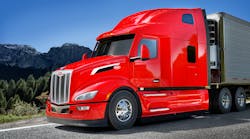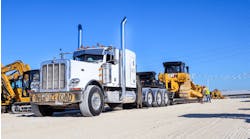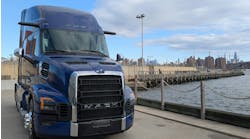Paccar Inc. delivered 46,900 trucks to customers during the second quarter—a 9% increase from early this year and up 17% year over year—and expects to be in that range for the third quarter as it looks to meet continued strong demand for new, higher-priced models.
Bellevue, Washington-based Paccar posted a second-quarter net profit of $720 million on total revenues of nearly $7.2 billion. Those numbers were up from $496 million and $5.8 billion, respectively, for the 2021 second quarter and were driven by a 65% surge in pre-tax truck profits. The company’s parts business was boosted by the trucking sector’s high utilization rates these days and its financial services group benefited from high used truck prices.
See also: Fleet execs struggle to gauge capacity trends ahead of peak seasonU.S. and Canadian customers took delivery of about 24,400 Peterbilt and Kenworth trucks during the three months ended June 30, up 8% from the prior-year period. North American revenues, however, surged 22% to nearly $4.4 billion thanks to customers’ willingness to pay more for new medium- and heavy-duty models with higher fuel efficiencies. That, Controller Michael Barclay said, meant that Paccar’s price hikes “more than kept pace with our cost increases.”
The Paccar executive team has reiterated its 2022 unit sales forecasts for its U.S. and European markets and, on a conference call with analysts and investors, CEO Preston Feight said both sales and margins should climb further in the coming quarters.
“Things are going really well for the company,” Feight said. “The new trucks are performing really well in the market in Europe and in North America. That performance is helping our customers perform better, providing excellent fuel economy for them, and the result of that is an improvement in margins.”
That upbeat outlook is holding up despite Paccar’s factory efficiency still not being back to pre-pandemic levels because of supply chain challenges. Feight told analysts things are moving in the right direction on that front but that Paccar has been focused more on producing as many vehicles as possible.
“Fleet age is up 10 or 15%. Truck utilization is very high. Freight tonnage and volumes are at very high levels,” Feight said. “We think those set up the market for a strong future.”
Shares of Paccar (Ticker: PCAR) rose 1% to nearly $87 on July 26. Year to date, they are down slightly.




